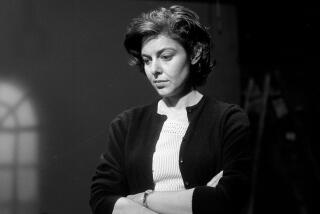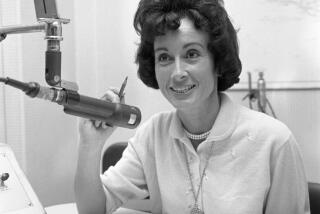Anne Froelick Taylor dies at 96; blacklisted screenwriter
Anne Froelick Taylor, a Hollywood screenwriter who co-wrote the 1950 Joan Crawford drama “Harriet Craig” but whose career was cut short when she was blacklisted during the McCarthy era, has died. She was 96.
Taylor, who received screen credit as Anne Froelick, died of natural causes Jan. 26 in a nursing home in Los Angeles, said her daughter, Priscilla Taylor Stephens.
A onetime model and actress in New York City, Taylor began her writing career in 1938 while serving as secretary to Howard Koch, then a writer for Orson Welles’ “The Mercury Theatre on the Air.”
Koch “soon began giving me dialogue to write and some of the scenes, and he encouraged me to be creative,” Taylor said in an interview for the 1997 book “Tender Comrades: A Backstory of the Hollywood Blacklist,” an oral history by Patrick McGilligan and Paul Buhle.
Taylor also assisted Koch on his adaptation of H.G. Wells’ “The War of the Worlds” for “The Mercury Theatre on the Air,” which made radio history when it was broadcast in 1938.
When Koch went to work as a writer at Warner Bros., he wanted the studio to hire Taylor as a writer. But, she recalled, Warner Bros. said she would have to start as Koch’s secretary and would be promoted to writer after six months. It took 18 months.
After helping Koch on the psychological themes and rewriting some of the scenes for his screenplay for the 1940 Bette Davis crime drama “The Letter,” Warner Bros. signed Taylor to a writing contract.
“So many of the women who were writing at that time didn’t get credit on things they worked on,” said her daughter. “It was really a big push by women in those days to get credit for the work they did.”
Taylor’s first screen credit was the 1941 drama “Shining Victory,” which she co-wrote with Koch.Four other Froelick writing credits followed: “The Master Race” (1944), “Miss Susie Slagle’s” (1946), “Easy Come, Easy Go” (1947) and “Harriet Craig.”Taylor’s involvement in left-wing causes, such as fighting against fascism and promoting unions and desegregation, had led her to join the Communist Party, her daughter said.
In 1951, Taylor’s party membership caused her husband, Philip Taylor, to lose his job as a manufacturing planner at Lockheed.
“He was escorted out of the plant by two guards,” Taylor’s daughter said. “I think it was to make a public display, which is what they were doing all over to frighten people. Interestingly, my mother hadn’t gotten work [as a writer] from 1950 to ‘53, so she feared she was sort of covertly blacklisted, not blatantly blacklisted.”
On the last day of the House Un-American Activities Committee’s last visit to Hollywood in 1953, two fellow screenwriters named Taylor as a Communist.
“Then,” her daughter said of the blacklist, “it was official.”
Taylor continued to try to make a living as a writer using her married name. She wrote four plays that were produced locally, including “Storm in the Sun.” And she co-wrote a comic novel, “Press on Regardless,” with Fern Mosk, which was published by Simon and Schuster in 1956.
She also did some anonymous editing and writing for a friend who wrote soap operas, Laura Olsher.”But she never was able to fully recover and make a living at it,” said her daughter.
In an interview Monday, Buhle said the blacklisted Taylor “symbolized an era of lost opportunities.”
“She was one of those people whose career barely started when it ended,” he said.
Born Dec. 8, 1913, in Hinsdale, Mass, she grew up in Princeton, N.J., and briefly attended Smith College before moving to New York City at 19 to try to start an acting career.
Besides her daughter Priscilla, Taylor is survived by another daughter, Frolic Taylor; and two grandchildren.
A memorial service is pending.
More to Read
Start your day right
Sign up for Essential California for the L.A. Times biggest news, features and recommendations in your inbox six days a week.
You may occasionally receive promotional content from the Los Angeles Times.






